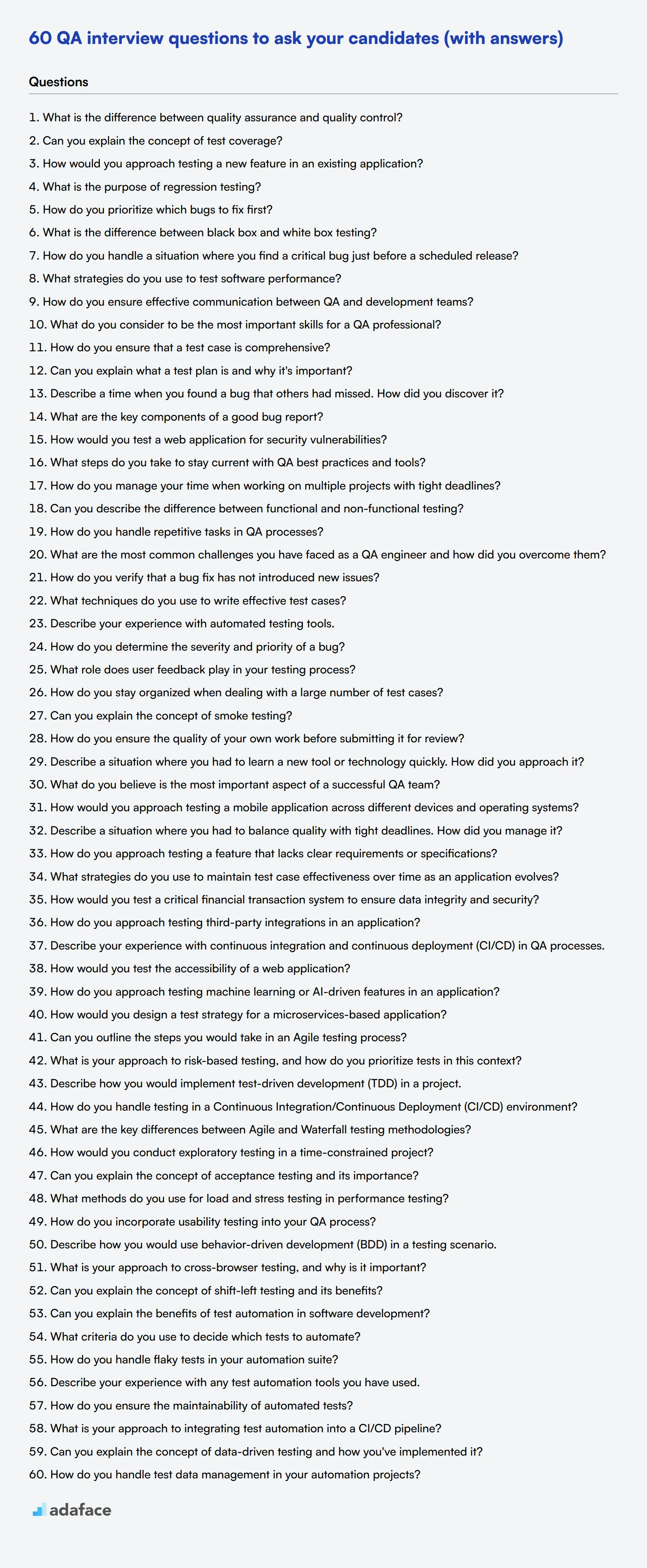Recruiting the right QA engineer can be a challenging task. Knowing the skills required for a quality assurance engineer helps, but interviewing with the right questions is key to identifying the best talent.
This blog post provides a curated list of QA interview questions tailored for various levels of experience. From basic to advanced topics, and even questions on testing methodologies and automation, you will have a comprehensive guide to assess applicants thoroughly.
With this guide, you can make informed hiring decisions and ensure you select candidates who meet your quality standards. Additionally, consider using our QA engineer test for a more efficient initial screening before the interview phase.
Table of contents
10 basic QA interview questions and answers to assess applicants
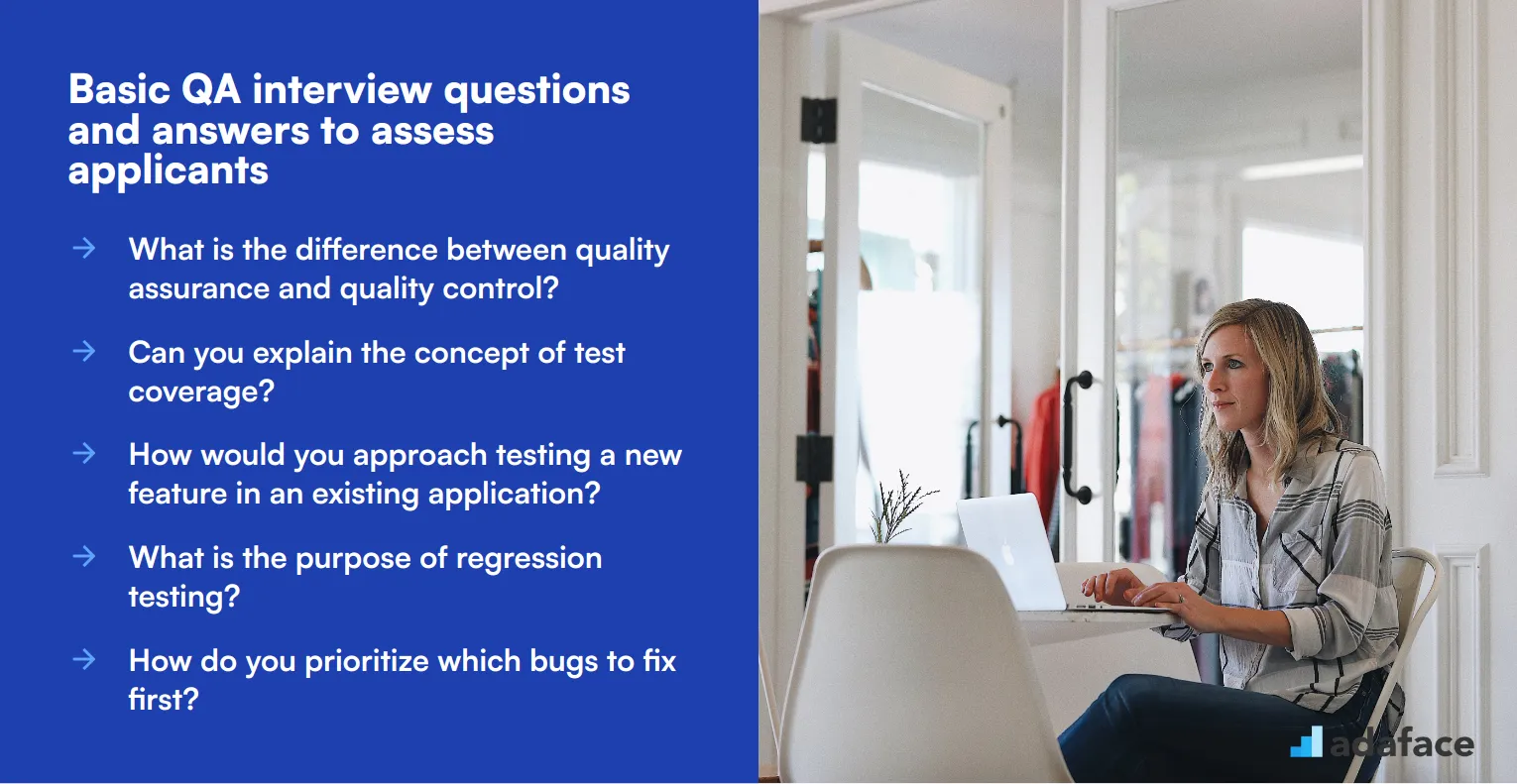
Ready to put your QA candidates through their paces? These 10 basic questions will help you assess applicants' fundamental understanding of quality assurance. Use this list to gauge their knowledge, problem-solving skills, and approach to quality control. Remember, the best candidates will not just recite textbook answers but demonstrate practical insight.
1. What is the difference between quality assurance and quality control?
Quality Assurance (QA) is a proactive process focused on preventing defects and ensuring that the development process itself is geared towards producing high-quality software. It involves planning, defining processes, and creating standards to guide the development and testing phases.
Quality Control (QC), on the other hand, is a reactive process that focuses on identifying defects in the finished or near-finished product. It involves activities like testing, inspection, and checking the product against specified requirements.
Look for candidates who can clearly articulate this distinction and provide examples of how these concepts are applied in real-world software development scenarios. Strong candidates might also discuss how QA and QC work together in a comprehensive quality management system.
2. Can you explain the concept of test coverage?
Test coverage is a metric that measures the extent to which a software application's source code has been tested. It helps in determining which parts of the program have been executed during the testing process and which have not.
There are different types of test coverage, including:
- Statement coverage: Percentage of code statements executed
- Branch coverage: Percentage of code branches (decision points) tested
- Function coverage: Percentage of functions called during testing
- Condition coverage: Percentage of Boolean sub-expressions tested
A good candidate should be able to explain why 100% test coverage doesn't necessarily mean bug-free software and discuss strategies for improving test coverage effectively.
3. How would you approach testing a new feature in an existing application?
A strong answer should outline a systematic approach, such as:
- Understanding the feature requirements and specifications
- Analyzing how the new feature integrates with existing functionality
- Identifying potential risk areas and edge cases
- Developing a test plan that includes various testing types (unit, integration, system, etc.)
- Creating test cases that cover both positive and negative scenarios
- Executing tests and documenting results
- Retesting after bug fixes and performing regression testing
Look for candidates who emphasize the importance of communication with developers and stakeholders throughout the process. They should also mention considering both functional and non-functional aspects of the feature, such as performance and usability.
4. What is the purpose of regression testing?
Regression testing is performed to ensure that recent program or code changes have not adversely affected existing features. Its main purposes are:
- To detect bugs that may have been introduced due to new code or modifications
- To verify that previously fixed bugs haven't resurfaced
- To ensure that the system still meets its specified requirements after changes
A good candidate should explain that regression testing is crucial for maintaining software quality over time, especially in agile environments with frequent updates. They might also discuss strategies for efficient regression testing, such as test case prioritization or automation.
5. How do you prioritize which bugs to fix first?
When prioritizing bug fixes, several factors should be considered:
- Severity: How much impact does the bug have on core functionality?
- Frequency: How often does the bug occur?
- User impact: How many users are affected?
- Business impact: Does the bug affect revenue or reputation?
- Ease of fix: Can it be quickly resolved without introducing new issues?
- Release schedule: Is there an upcoming release that the fix should be included in?
Look for candidates who demonstrate a balanced approach, considering both technical and business perspectives. They should also mention the importance of collaborating with product managers and developers in this decision-making process.
6. What is the difference between black box and white box testing?
Black box testing is a method of software testing that examines the functionality of an application without peering into its internal structures or workings. This type of testing is based solely on the software requirements and specifications. Testers are only aware of what the software is supposed to do, not how it does it.
White box testing, also known as clear box testing, is a method of testing software that tests internal structures or workings of an application. In white box testing, the tester has access to the internal data structures and algorithms including the code that implement these.
A strong candidate should be able to discuss the advantages and disadvantages of each approach, and when to use one over the other. They might also mention gray box testing, which combines elements of both black box and white box testing.
7. How do you handle a situation where you find a critical bug just before a scheduled release?
Handling a critical bug discovery near release requires quick thinking and clear communication. A good approach might include:
- Immediately notify the project manager and development team
- Thoroughly document the bug, including steps to reproduce and potential impact
- Work with developers to assess the severity and complexity of the fix
- Discuss options with stakeholders (fix and delay, release with known issue, partial rollback)
- If fixing, ensure adequate testing of the fix and regression testing
- Update release notes and user documentation if necessary
Look for candidates who emphasize the importance of clear communication, quick decision-making, and a focus on both short-term resolution and long-term quality. They should also mention the need to conduct a post-mortem to prevent similar last-minute issues in future releases.
8. What strategies do you use to test software performance?
Effective performance testing strategies might include:
- Load testing: Simulating expected user loads to check system behavior
- Stress testing: Pushing the system beyond normal operational capacity
- Scalability testing: Determining the software's ability to scale up or down
- Endurance testing: Checking system performance over extended periods
- Spike testing: Suddenly increasing or decreasing the load on the system
- Volume testing: Flooding the system with large amounts of data
A strong candidate should discuss the importance of establishing clear performance metrics and baselines. They might also mention tools they've used for performance testing and how they analyze and report results. Look for awareness of both server-side and client-side performance considerations.
9. How do you ensure effective communication between QA and development teams?
Effective communication between QA and development teams is crucial for producing high-quality software. Strategies might include:
- Regular stand-up meetings to discuss progress and blockers
- Using collaborative tools for bug tracking and project management
- Involving QA early in the development process, including requirement reviews
- Pair testing sessions where developers and testers work together
- Clear, detailed bug reports with steps to reproduce and expected vs. actual results
- Encouraging a culture of open communication and mutual respect
Look for candidates who emphasize the importance of building relationships and understanding the developers' perspective. They should also mention how good communication can lead to more efficient bug fixes and overall improved product quality.
10. What do you consider to be the most important skills for a QA professional?
Key skills for a QA professional include:
- Attention to detail: Ability to spot small inconsistencies or potential issues
- Analytical thinking: Breaking down complex systems and identifying problem areas
- Communication: Clearly articulating issues and collaborating with team members
- Technical knowledge: Understanding of testing methodologies and relevant technologies
- Adaptability: Keeping up with changing technologies and methodologies
- Time management: Efficiently prioritizing and executing testing tasks
- Curiosity: Always asking 'what if' and exploring edge cases
A strong candidate should be able to provide examples of how they've applied these skills in their work. They might also mention soft skills like patience, persistence, and a passion for quality. Look for candidates who emphasize continuous learning and staying updated with industry trends.
20 QA interview questions to ask junior engineers
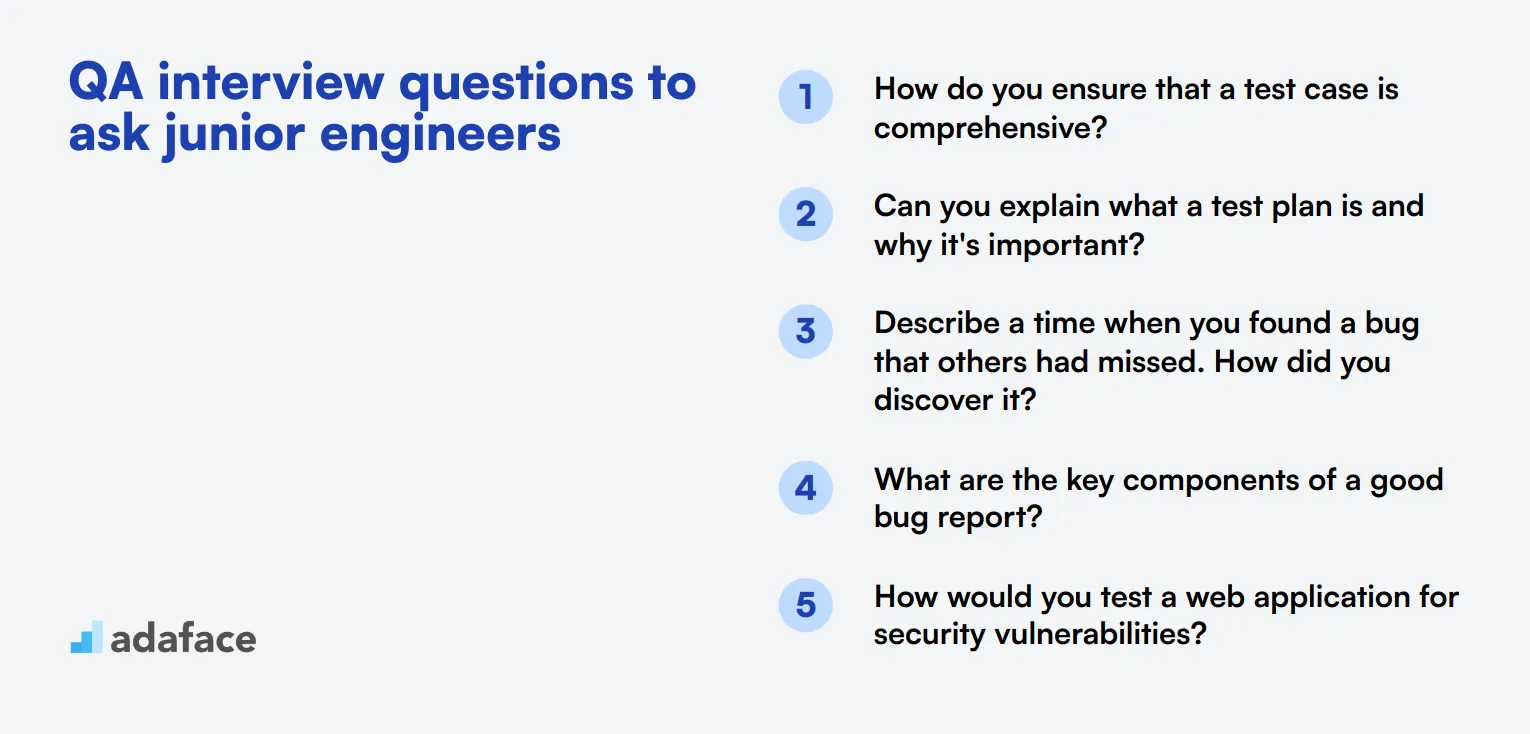
To effectively evaluate junior QA engineers, use these tailored interview questions to gauge their foundational knowledge and practical skills. These questions are designed to help you identify candidates who have a solid understanding of QA principles and can apply them in real-world scenarios. For additional insights into what to look for, you can review our QA Lead job description.
- How do you ensure that a test case is comprehensive?
- Can you explain what a test plan is and why it's important?
- Describe a time when you found a bug that others had missed. How did you discover it?
- What are the key components of a good bug report?
- How would you test a web application for security vulnerabilities?
- What steps do you take to stay current with QA best practices and tools?
- How do you manage your time when working on multiple projects with tight deadlines?
- Can you describe the difference between functional and non-functional testing?
- How do you handle repetitive tasks in QA processes?
- What are the most common challenges you have faced as a QA engineer and how did you overcome them?
- How do you verify that a bug fix has not introduced new issues?
- What techniques do you use to write effective test cases?
- Describe your experience with automated testing tools.
- How do you determine the severity and priority of a bug?
- What role does user feedback play in your testing process?
- How do you stay organized when dealing with a large number of test cases?
- Can you explain the concept of smoke testing?
- How do you ensure the quality of your own work before submitting it for review?
- Describe a situation where you had to learn a new tool or technology quickly. How did you approach it?
- What do you believe is the most important aspect of a successful QA team?
10 intermediate QA interview questions and answers to ask mid-tier engineers
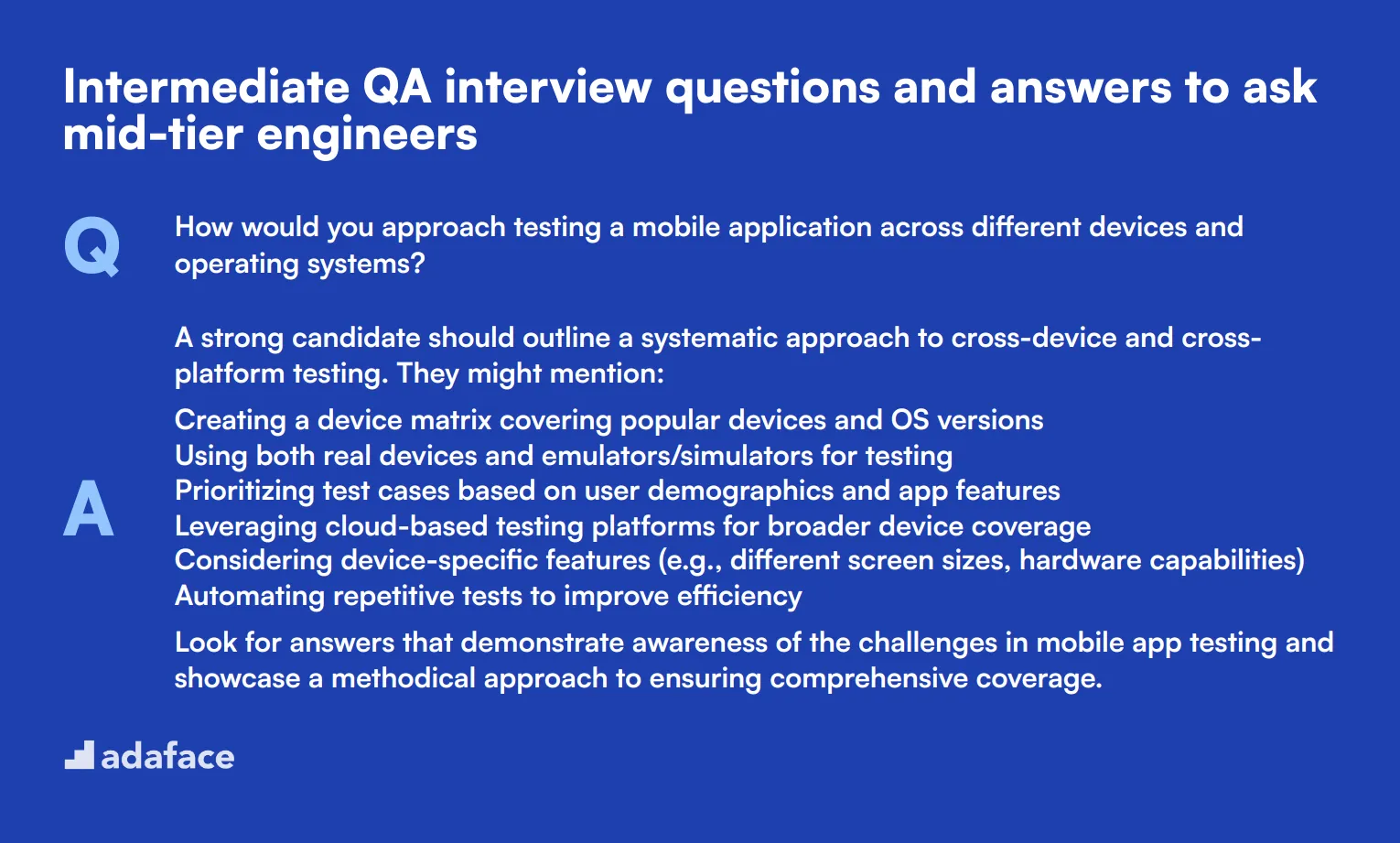
Ready to level up your QA interview game? These 10 intermediate questions are perfect for assessing mid-tier engineers. They'll help you gauge a candidate's practical knowledge and problem-solving skills without diving too deep into technical jargon. Use these questions to spark insightful discussions and uncover the true potential of your QA candidates.
1. How would you approach testing a mobile application across different devices and operating systems?
A strong candidate should outline a systematic approach to cross-device and cross-platform testing. They might mention:
- Creating a device matrix covering popular devices and OS versions
- Using both real devices and emulators/simulators for testing
- Prioritizing test cases based on user demographics and app features
- Leveraging cloud-based testing platforms for broader device coverage
- Considering device-specific features (e.g., different screen sizes, hardware capabilities)
- Automating repetitive tests to improve efficiency
Look for answers that demonstrate awareness of the challenges in mobile app testing and showcase a methodical approach to ensuring comprehensive coverage.
2. Describe a situation where you had to balance quality with tight deadlines. How did you manage it?
An experienced QA engineer should be able to share a specific example that demonstrates their ability to prioritize and make strategic decisions under pressure. A good answer might include:
- Clearly communicating the situation to stakeholders
- Prioritizing test cases based on risk and impact
- Negotiating for additional resources or time if absolutely necessary
- Implementing time-saving measures like automated testing or parallel testing
- Focusing on critical functionality and deferring less crucial tests
Pay attention to how the candidate balances quality assurance with project constraints. Look for signs of good communication, prioritization skills, and creative problem-solving in their response.
3. How do you approach testing a feature that lacks clear requirements or specifications?
A competent QA engineer should demonstrate proactivity and problem-solving skills when faced with ambiguous requirements. A strong answer might include steps like:
- Reaching out to product owners or stakeholders for clarification
- Analyzing similar features or industry standards for guidance
- Creating assumption documents to outline testing boundaries
- Developing exploratory testing scenarios to uncover potential issues
- Collaborating with developers to understand the implementation
- Proposing and documenting test cases for stakeholder review
Look for candidates who show initiative in gathering information, communicate effectively with team members, and can work independently to define testing parameters when faced with uncertainty.
4. What strategies do you use to maintain test case effectiveness over time as an application evolves?
An experienced QA engineer should recognize the importance of keeping test cases up-to-date. A comprehensive answer might include:
- Regularly reviewing and updating test cases during sprint planning or grooming sessions
- Implementing a version control system for test cases
- Tagging or categorizing tests for easy maintenance
- Automating repetitive tests to reduce manual maintenance overhead
- Conducting periodic audits of the test suite to remove obsolete cases
- Collaborating with developers to understand code changes and their impact on existing tests
Look for candidates who demonstrate a proactive approach to test maintenance and understand the importance of keeping the test suite aligned with the evolving application. Their answer should reflect an understanding of the software development lifecycle and the role of QA within it.
5. How would you test a critical financial transaction system to ensure data integrity and security?
Testing a financial transaction system requires a comprehensive approach. A strong answer should cover various aspects of testing, including:
- Thorough functional testing of all transaction types
- Security testing, including penetration testing and vulnerability assessments
- Performance testing under various load conditions
- Data integrity checks, including database consistency and transaction atomicity
- Error handling and recovery testing
- Compliance testing with relevant financial regulations (e.g., PCI DSS)
- End-to-end testing of complete transaction flows
- Negative testing with invalid inputs and edge cases
Look for candidates who demonstrate a deep understanding of the criticality of financial systems. They should emphasize the importance of data integrity, security, and thorough testing methodologies. Pay attention to mentions of specific security measures or compliance standards, which indicate a broader awareness of the financial technology landscape.
6. How do you approach testing third-party integrations in an application?
Testing third-party integrations requires a careful and methodical approach. A comprehensive answer might include:
- Thoroughly reviewing the integration documentation and API specifications
- Setting up a test environment that mimics the production setup
- Creating test data that covers various scenarios and edge cases
- Developing both positive and negative test cases
- Verifying data flow and transformation between systems
- Testing error handling and fallback mechanisms
- Simulating various network conditions and API response times
- Coordinating with the third-party vendor for test support if necessary
Look for candidates who understand the complexities of integration testing. They should emphasize the importance of thorough documentation review, comprehensive test coverage, and the ability to simulate various conditions. A good answer might also mention the need for clear communication with both internal teams and external vendors.
7. Describe your experience with continuous integration and continuous deployment (CI/CD) in QA processes.
A skilled QA engineer should be familiar with CI/CD practices and their impact on quality assurance. A strong answer might include:
- Experience with CI/CD tools like Jenkins, GitLab CI, or CircleCI
- Integration of automated tests into the CI/CD pipeline
- Implementation of smoke tests and regression tests at different stages
- Strategies for managing test data in CI/CD environments
- Approaches to handling test failures in the pipeline
- Collaboration with DevOps teams to optimize the CI/CD process
- Experience with containerization technologies like Docker for consistent test environments
Look for candidates who demonstrate an understanding of how CI/CD impacts the QA process. They should be able to explain how automation and frequent deployments affect testing strategies and how they've adapted their approach to ensure quality in a fast-paced environment.
8. How would you test the accessibility of a web application?
Testing for accessibility is crucial in modern web development. A comprehensive answer should cover various aspects of accessibility testing, including:
- Familiarity with accessibility guidelines like WCAG
- Use of automated accessibility testing tools (e.g., WAVE, aXe)
- Manual testing with screen readers and keyboard navigation
- Checking color contrast and font sizes
- Testing with various assistive technologies
- Verifying proper use of ARIA attributes
- Ensuring logical tab order and focus management
- Testing across different browsers and devices
Look for candidates who demonstrate awareness of accessibility standards and the importance of inclusive design. They should understand that accessibility testing involves both automated tools and manual testing methods. A good answer might also mention the legal and ethical reasons for prioritizing accessibility in web applications.
9. How do you approach testing machine learning or AI-driven features in an application?
Testing AI or machine learning features presents unique challenges. A strong answer might include:
- Understanding the basics of the AI/ML model and its expected behavior
- Creating a diverse set of test data to cover various scenarios
- Testing model accuracy and performance metrics
- Verifying the system's ability to handle unexpected inputs
- Testing for bias and fairness in model outputs
- Implementing A/B testing for comparing model versions
- Monitoring and logging model predictions for analysis
- Collaborating closely with data scientists and ML engineers
Look for candidates who recognize the complexity of testing AI-driven features. They should emphasize the importance of diverse test data, understanding model metrics, and the need for ongoing monitoring. A good answer might also touch on ethical considerations in AI testing, such as bias detection and fairness assessments.
10. How would you design a test strategy for a microservices-based application?
Testing microservices architectures requires a multi-layered approach. A comprehensive answer might include:
- Unit testing individual microservices
- Integration testing between microservices
- Contract testing to verify API compatibility
- End-to-end testing of complete user flows
- Performance testing of individual services and the system as a whole
- Chaos engineering practices to test system resilience
- Monitoring and observability considerations
- Security testing for each microservice and their interactions
Look for candidates who understand the complexities of microservices architectures. They should emphasize the importance of testing at multiple levels, from individual services to the entire system. A good answer might also mention tools specific to microservices testing, such as service virtualization or container-based testing environments.
12 QA questions related to testing methodologies
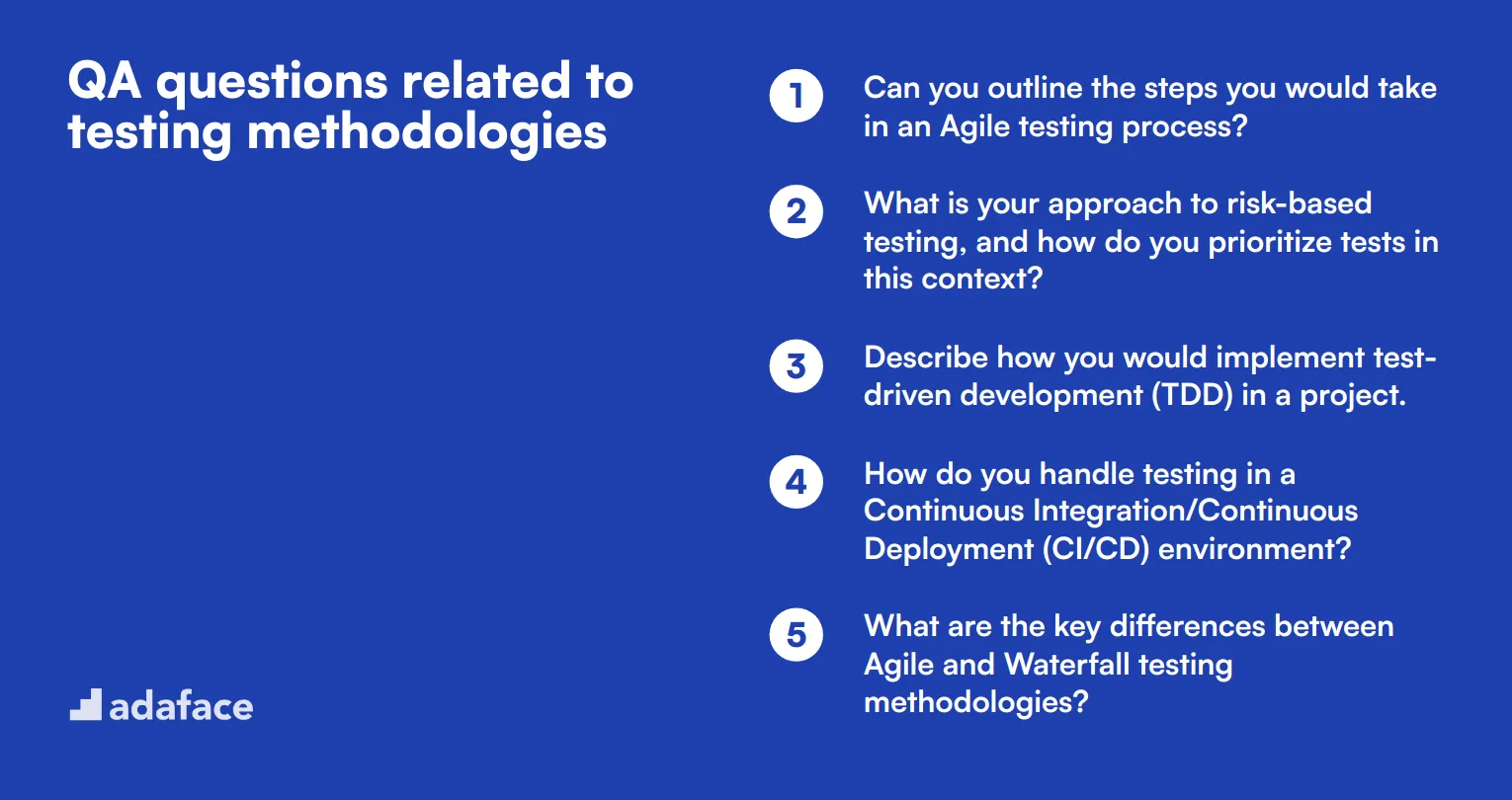
To effectively evaluate a candidate's understanding of different testing methodologies, consider using this curated list of QA questions. These questions are designed to help you identify whether applicants possess the right skills and knowledge crucial for a QA Lead role.
- Can you outline the steps you would take in an Agile testing process?
- What is your approach to risk-based testing, and how do you prioritize tests in this context?
- Describe how you would implement test-driven development (TDD) in a project.
- How do you handle testing in a Continuous Integration/Continuous Deployment (CI/CD) environment?
- What are the key differences between Agile and Waterfall testing methodologies?
- How would you conduct exploratory testing in a time-constrained project?
- Can you explain the concept of acceptance testing and its importance?
- What methods do you use for load and stress testing in performance testing?
- How do you incorporate usability testing into your QA process?
- Describe how you would use behavior-driven development (BDD) in a testing scenario.
- What is your approach to cross-browser testing, and why is it important?
- Can you explain the concept of shift-left testing and its benefits?
8 QA interview questions and answers related to test automation
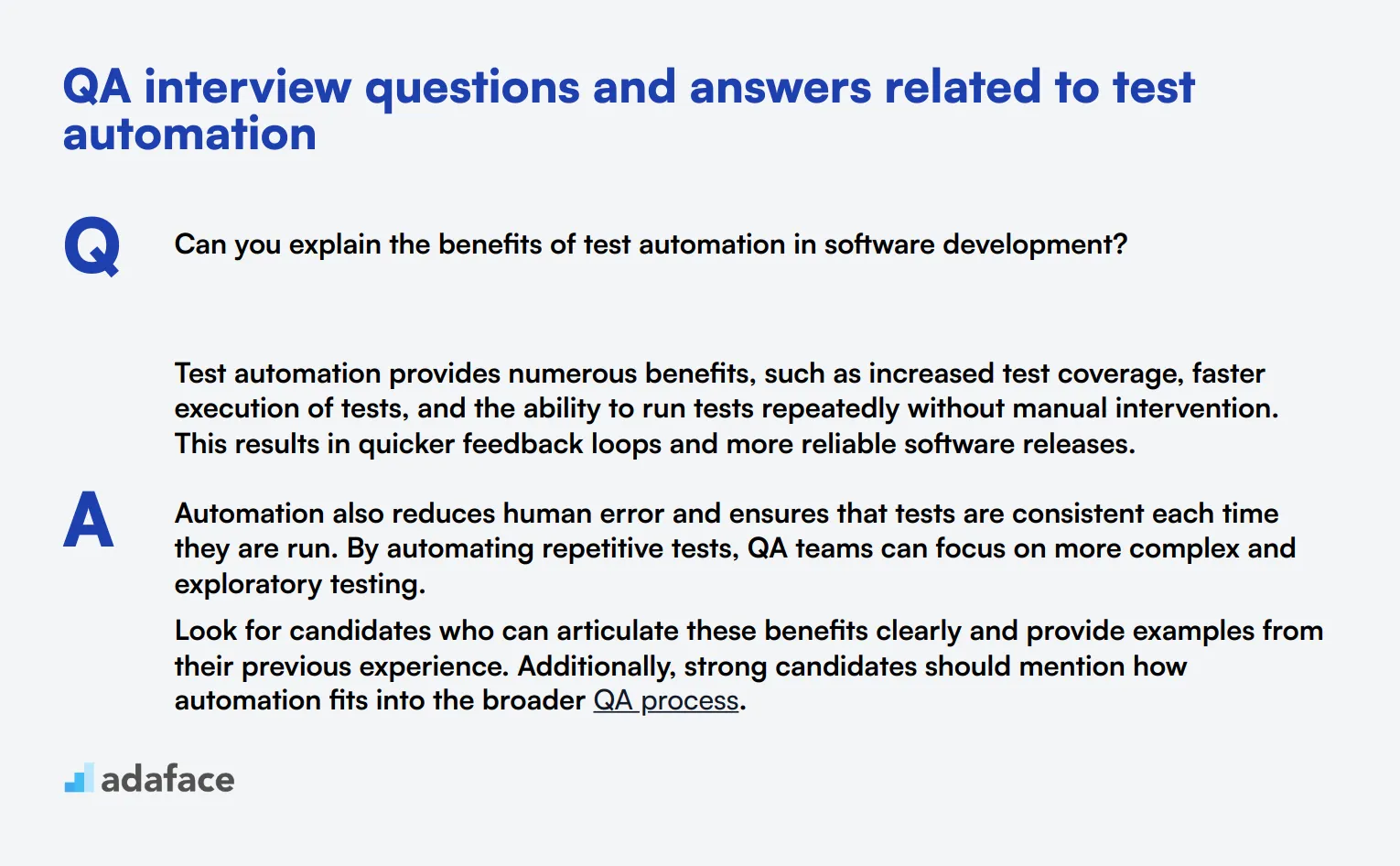
When it comes to test automation, it's crucial to know if your candidates have the right skills and mindset. This list of questions is designed to help you uncover their practical knowledge and approach to automation, ensuring they can handle the challenges your projects may present.
1. Can you explain the benefits of test automation in software development?
Test automation provides numerous benefits, such as increased test coverage, faster execution of tests, and the ability to run tests repeatedly without manual intervention. This results in quicker feedback loops and more reliable software releases.
Automation also reduces human error and ensures that tests are consistent each time they are run. By automating repetitive tests, QA teams can focus on more complex and exploratory testing.
Look for candidates who can articulate these benefits clearly and provide examples from their previous experience. Additionally, strong candidates should mention how automation fits into the broader QA process.
2. What criteria do you use to decide which tests to automate?
Tests that are repetitive, time-consuming, and critical for functionality are strong candidates for automation. This includes regression tests, smoke tests, and performance tests.
It's also important to consider the stability of the test environment and the return on investment. Tests that are run frequently and have a high likelihood of finding defects should be prioritized.
An ideal candidate will be able to provide a logical framework for selecting tests to automate and discuss how they balance the initial setup cost with long-term benefits.
3. How do you handle flaky tests in your automation suite?
Flaky tests are those that fail or pass inconsistently. To handle them, one must first identify the root cause, which could be due to timing issues, dependencies, or environmental factors.
Once identified, solutions can include adding wait times, mocking unstable components, or isolating tests to run in a controlled environment. Regular maintenance and review of the test suite are also essential to minimize flakiness.
Candidates should demonstrate an understanding of common causes of flaky tests and share examples of how they have resolved such issues in the past.
4. Describe your experience with any test automation tools you have used.
Candidates might discuss tools such as Selenium, JUnit, or TestNG. They should describe their hands-on experience, including the types of tests they automated and any challenges they faced.
They might also mention setting up test environments, integrating tools with CI/CD pipelines, and customizing tools to fit specific project needs.
Look for candidates who can detail not just their familiarity with tools but also how they have used them to improve the QA process and deliver reliable software.
5. How do you ensure the maintainability of automated tests?
Ensuring maintainability involves writing clear, modular, and reusable test scripts. This includes following coding standards and using descriptive names for tests and variables.
Regular code reviews and refactoring are essential to keep the test suite clean and efficient. Additionally, using version control helps track changes and collaborate effectively.
An ideal response will emphasize the importance of maintainability and provide examples of best practices the candidate follows to achieve it.
6. What is your approach to integrating test automation into a CI/CD pipeline?
Integrating test automation into a CI/CD pipeline involves setting up automated tests to run at various stages of the pipeline, ensuring that tests are run consistently with each code change.
Candidates should discuss their experience with CI/CD tools like Jenkins, GitLab CI, or CircleCI, and how they configure these tools to run tests, generate reports, and handle notifications.
Look for candidates who can explain the benefits of this integration, such as faster feedback and early detection of issues, and provide examples of successful implementations.
7. Can you explain the concept of data-driven testing and how you've implemented it?
Data-driven testing involves executing the same test case with multiple sets of data inputs to ensure the application behaves as expected under various conditions. This helps in identifying defects that might not be obvious with a single set of data.
Implementation typically involves using external data sources like CSV files, databases, or Excel spreadsheets to feed test data into automated tests.
Candidates should be able to explain the benefits of this approach and provide examples of how they have implemented it to improve test coverage and efficiency.
8. How do you handle test data management in your automation projects?
Effective test data management involves creating, maintaining, and cleaning data sets needed for automated tests. This can include using tools to generate test data, setting up databases, and ensuring data privacy and security.
Candidates should discuss strategies for handling dynamic data, such as using mock data or data factories, and how they ensure data consistency across different test environments.
Look for candidates who understand the importance of reliable test data and have practical strategies for managing it in complex projects.
Which QA skills should you evaluate during the interview phase?
In a single interview, it’s nearly impossible to evaluate every aspect of a candidate's skills and abilities. However, there are several core QA skills that are critical to assess during the interview phase. By focusing on these key areas, you can gain valuable insights into a candidate’s potential fit for your QA team.
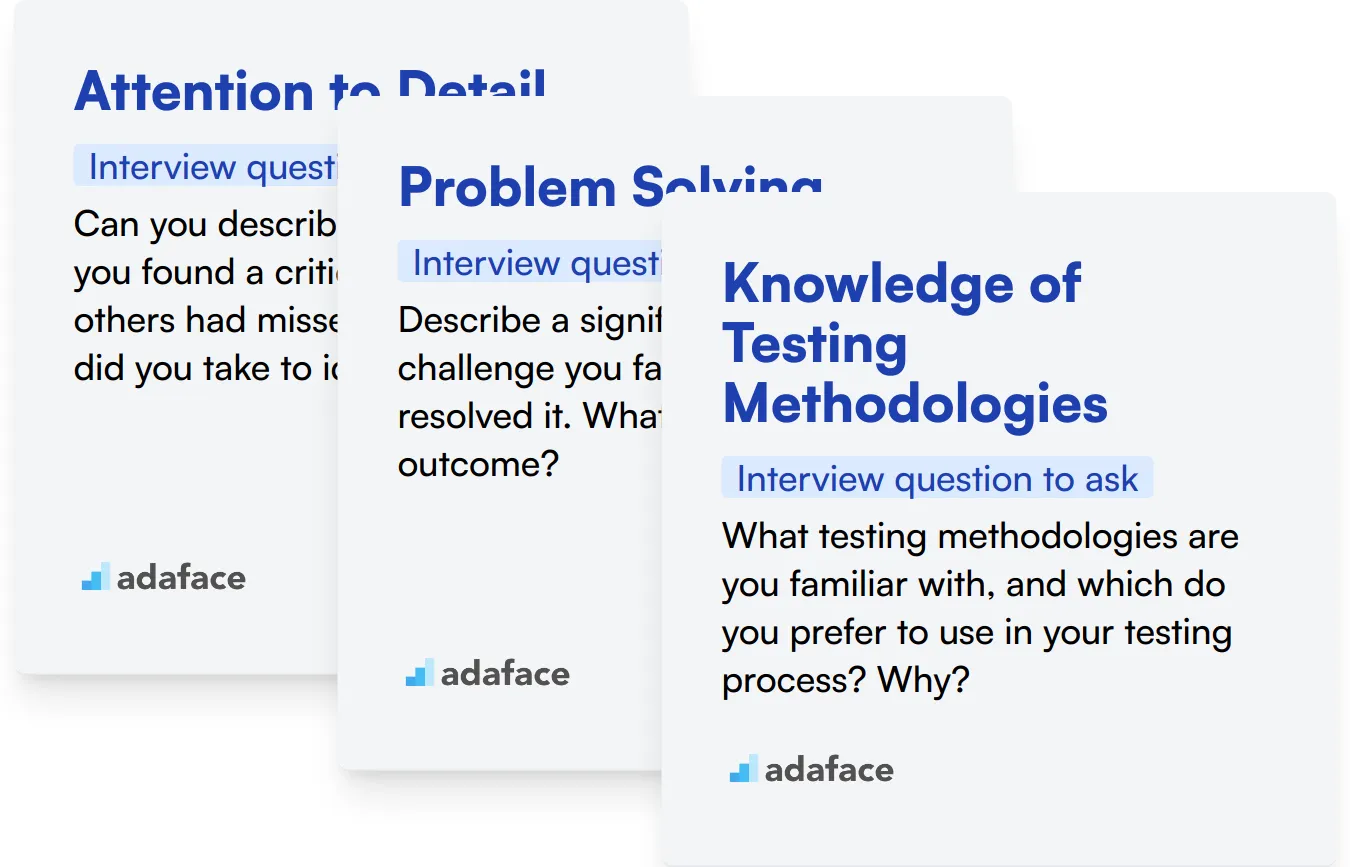
Attention to Detail
To effectively gauge a candidate's attention to detail, consider using an assessment test that includes relevant multiple-choice questions. You might find tests in our library that specifically target this skill, such as the Attention to Detail Test.
Another effective approach is to ask targeted interview questions to assess this skill directly.
Can you describe a time when you found a critical bug that others had missed? What steps did you take to identify it?
Look for responses that highlight the candidate's methodical approach to testing and how they prioritize thoroughness. Their ability to recall specific instances demonstrates both their experience and their focus on detail.
Problem Solving
Utilizing a structured assessment test with relevant MCQs can help you evaluate this critical skill. Explore our collection for a Problem-Solving Test that allows you to effectively assess candidates.
Additionally, asking specific questions can help you understand a candidate's problem-solving approach.
Describe a significant testing challenge you faced and how you resolved it. What was the outcome?
Observe how candidates articulate their thought process and the steps they took to overcome the challenge. Strong candidates will demonstrate analytical thinking and a proactive approach to problem resolution.
Knowledge of Testing Methodologies
Consider incorporating an assessment that tests knowledge of different QA methodologies. Our library may have a Testing Methodologies Test that fits your needs.
You can also evaluate this knowledge through targeted questioning.
What testing methodologies are you familiar with, and which do you prefer to use in your testing process? Why?
Pay attention to the breadth of their knowledge and their ability to justify their preferences. This can indicate their depth of experience and adaptability in different scenarios.
Effective Strategies for Utilizing QA Interview Questions
Before you start implementing the QA interview questions you've learned from this post, here are some essential tips to ensure you use them effectively in your recruitment process.
1. Incorporate Skills Tests to Pre-Qualify Candidates
Implementing skills tests before the interview stage is a strategic move. It helps in filtering candidates who actually possess the necessary technical skills from those who merely claim to have them.
For QA roles, consider using specific tests like the QA Engineer Test or the Selenium Online Test to assess candidates' practical abilities and theoretical knowledge.
By integrating these assessments early in the hiring process, you not only streamline the number of interviews but also enhance the quality of candidates proceeding to the interview stage, ensuring a more efficient hiring process.
2. Select and Tailor Your Interview Questions Carefully
Time during interviews is limited, making it imperative to choose questions that accurately evaluate crucial competencies. Focus on constructing a set that examines key skills and knowledge relevant to the QA role.
Explore interviewing questions beyond the basics by incorporating queries that assess soft skills like communication or problem-solving, essential for a comprehensive understanding of the candidate's capabilities.
3. Always Follow Up with Probing Questions
While standard interview questions are informative, follow-up questions are key to diving deeper into a candidate’s expertise and authenticity. This approach helps in discerning rehearsed answers from genuine knowledge.
For instance, if a candidate describes a past project testing scenario, ask them to detail specific challenges they faced and how they overcame them. This not only reveals their problem-solving skills but also their ability to adapt to real-world issues.
Leveraging Skill Tests and QA Interview Questions for Effective Hiring
When aiming to hire professionals with specific QA skills, confirming their proficiency is key. The best approach is through targeted skill tests. For instance, using tests like the QA Engineer Test or the Manual Testing Online Test can accurately assess their abilities.
After applying these tests, you can efficiently shortlist top candidates, inviting only the most qualified for interviews. For more information or to begin the testing process, visit our Sign Up page or explore our Test Library.
QA Engineer Test
Download QA interview questions template in multiple formats
QA Interview Questions FAQs
Basic QA interview questions focus on fundamental concepts such as testing types, bug life cycle, and the role of QA in development.
For junior QA engineers, ask questions related to their understanding of basic testing concepts, methodologies, and tools they have used.
Intermediate questions for mid-tier engineers can include scenario-based queries, advanced testing methodologies, and their experience with test automation.
Questions related to testing methodologies help you understand if the candidate is well-versed in different approaches and can apply them appropriately.
Look for detailed knowledge of automation tools, frameworks, and scripting languages. Also, assess their ability to design and execute automated test cases.

40 min skill tests.
No trick questions.
Accurate shortlisting.
We make it easy for you to find the best candidates in your pipeline with a 40 min skills test.
Try for freeRelated posts
Free resources




